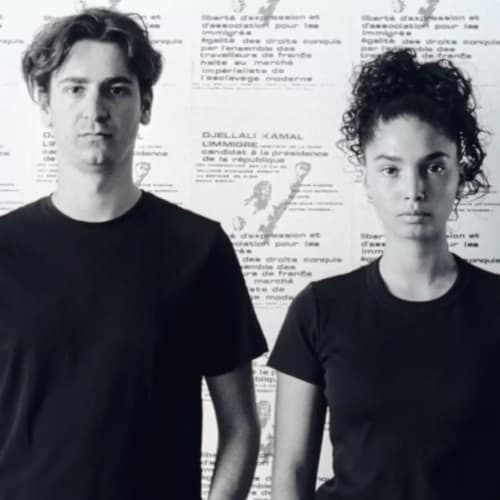Starting from July 02, 2023
Bouchra Khalili works across different media including film, video, installation, photography, works on paper and editorial platforms.
Her transdisciplinary practice suggests a novel civic imagination that can allow us to envision new ways of belonging, liberated from the restrictive concept of identity imposed by normative political structures such as the nation-state model.
Film and video play a central role in her thinking. Known for complex and multilayered narrative constructions, Khalili’s filmic works draw on suppressed historical moments of collective emancipation that span diverse histories, geographies, and generations. Neither documentary nor fiction, her deeply researched “film hypotheses” articulate language, oral transmission, poetic invocations, storytelling, and innovative visual forms.
Experimenting with montage, Khalili’s editing process is a key tool of her narration techniques. In her films, the nonprofessional performers are, at the same time, the film’s storytellers and “editors”. They narrate and act out textual and visual constellations of unarchived stories of collective emancipation that were suppressed by official narratives. Putting together fragments of oral histories with personal testimonies, texts, photographs, and moving images, they dynamically activate the past while revealing its connections to the present. Summoning poetically the ghosts of unachieved promises and the failures of modern politics, Khalili’s films invite viewers to become the witnesses of our history and to contemplate our potential collective future.
The exhibition brings together two of Khalili’s seminal film works: The Tempest Society (2017) and The Circle Project (2023), a mixed-media installation composed of the synchronized two-channel video installation The Circle (2023), the mural poster A Timeline for a Constellation (2023) and The Storytellers (2023), a five-channel film installation on monitors.
This set of works departs from Khalili’s extensive research on Le Mouvement des Travailleurs Arabes (MTA, Movement of Arab Workers) and its theater groups, Al Assifa (The Tempest in Arabic) and Al Halaka (The Circle in Arabic, which is also referencing the tradition of public storytelling that is common in North Africa). The MTA was a pioneering autonomous organization led by Maghrebi workers during the 1970s in France, advocating for equal rights. Theater was central to their activism, epitomizing their conception of solidarity and allyship, as it brought together Maghrebi workers and their French allies.
Set in Athens, The Tempest Society references the theatrical experiments of Al Assifa in order to examine their topicality in the context of the humanitarian, social, and economic crisis that marked the Greek capital in 2016.The Circle continues the same story, examining closely the birth of the MTA in 1973 both in Paris and in Marseille, its theater groups, and the candidacy of one of their undocumented members in the French presidential election in 1974. Further to these, The Storytellers (2023) suggests a contemplative space for history, where former members of Al Assifa and Al Halaka perform parts of their unarchived oral repertory fifty years after their first performance.
Together, the works in the exhibition propose alternative forms of belonging, production of collectivities with and through subjectivity. They offer a meditative approach to witnessing suppressed histories, the power of collective fabulation as epitomized by the public storyteller, and “montage” as the art capable of resurrecting buried history.
The Circle is co-produced and co-commissioned by Sharjah Art Foundation, LUMA Foundation and MACBA.
Curated by Vassilis Oikonomopoulos, Director of Exhibitions and Programs.


